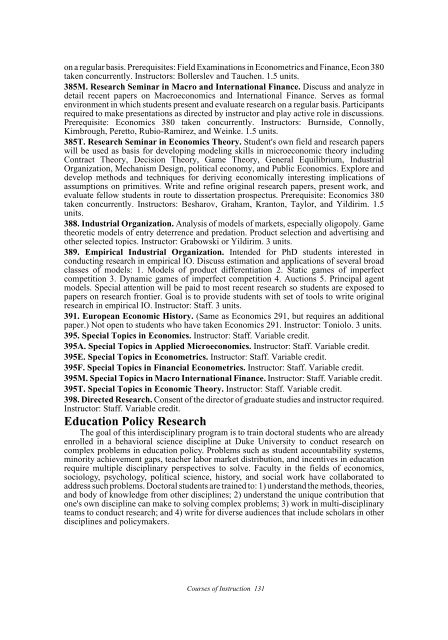Duke University 2008-2009 - Office of the Registrar - Duke University
Duke University 2008-2009 - Office of the Registrar - Duke University
Duke University 2008-2009 - Office of the Registrar - Duke University
You also want an ePaper? Increase the reach of your titles
YUMPU automatically turns print PDFs into web optimized ePapers that Google loves.
on a regular basis. Prerequisites: Field Examinations in Econometrics and Finance, Econ 380<br />
taken concurrently. Instructors: Bollerslev and Tauchen. 1.5 units.<br />
385M. Research Seminar in Macro and International Finance. Discuss and analyze in<br />
detail recent papers on Macroeconomics and International Finance. Serves as formal<br />
environment in which students present and evaluate research on a regular basis. Participants<br />
required to make presentations as directed by instructor and play active role in discussions.<br />
Prerequisite: Economics 380 taken concurrently. Instructors: Burnside, Connolly,<br />
Kimbrough, Peretto, Rubio-Ramirez, and Weinke. 1.5 units.<br />
385T. Research Seminar in Economics Theory. Student's own field and research papers<br />
will be used as basis for developing modeling skills in microeconomic <strong>the</strong>ory including<br />
Contract Theory, Decision Theory, Game Theory, General Equilibrium, Industrial<br />
Organization, Mechanism Design, political economy, and Public Economics. Explore and<br />
develop methods and techniques for deriving economically interesting implications <strong>of</strong><br />
assumptions on primitives. Write and refine original research papers, present work, and<br />
evaluate fellow students in route to dissertation prospectus. Prerequisite: Economics 380<br />
taken concurrently. Instructors: Besharov, Graham, Kranton, Taylor, and Yildirim. 1.5<br />
units.<br />
388. Industrial Organization. Analysis <strong>of</strong> models <strong>of</strong> markets, especially oligopoly. Game<br />
<strong>the</strong>oretic models <strong>of</strong> entry deterrence and predation. Product selection and advertising and<br />
o<strong>the</strong>r selected topics. Instructor: Grabowski or Yildirim. 3 units.<br />
389. Empirical Industrial Organization. Intended for PhD students interested in<br />
conducting research in empirical IO. Discuss estimation and applications <strong>of</strong> several broad<br />
classes <strong>of</strong> models: 1. Models <strong>of</strong> product differentiation 2. Static games <strong>of</strong> imperfect<br />
competition 3. Dynamic games <strong>of</strong> imperfect competition 4. Auctions 5. Principal agent<br />
models. Special attention will be paid to most recent research so students are exposed to<br />
papers on research frontier. Goal is to provide students with set <strong>of</strong> tools to write original<br />
research in empirical IO. Instructor: Staff. 3 units.<br />
391. European Economic History. (Same as Economics 291, but requires an additional<br />
paper.) Not open to students who have taken Economics 291. Instructor: Toniolo. 3 units.<br />
395. Special Topics in Economics. Instructor: Staff. Variable credit.<br />
395A. Special Topics in Applied Microeconomics. Instructor: Staff. Variable credit.<br />
395E. Special Topics in Econometrics. Instructor: Staff. Variable credit.<br />
395F. Special Topics in Financial Econometrics. Instructor: Staff. Variable credit.<br />
395M. Special Topics in Macro International Finance. Instructor: Staff. Variable credit.<br />
395T. Special Topics in Economic Theory. Instructor: Staff. Variable credit.<br />
398. Directed Research. Consent <strong>of</strong> <strong>the</strong> director <strong>of</strong> graduate studies and instructor required.<br />
Instructor: Staff. Variable credit.<br />
Education Policy Research<br />
The goal <strong>of</strong> this interdisciplinary program is to train doctoral students who are already<br />
enrolled in a behavioral science discipline at <strong>Duke</strong> <strong>University</strong> to conduct research on<br />
complex problems in education policy. Problems such as student accountability systems,<br />
minority achievement gaps, teacher labor market distribution, and incentives in education<br />
require multiple disciplinary perspectives to solve. Faculty in <strong>the</strong> fields <strong>of</strong> economics,<br />
sociology, psychology, political science, history, and social work have collaborated to<br />
address such problems. Doctoral students are trained to: 1) understand <strong>the</strong> methods, <strong>the</strong>ories,<br />
and body <strong>of</strong> knowledge from o<strong>the</strong>r disciplines; 2) understand <strong>the</strong> unique contribution that<br />
one's own discipline can make to solving complex problems; 3) work in multi-disciplinary<br />
teams to conduct research; and 4) write for diverse audiences that include scholars in o<strong>the</strong>r<br />
disciplines and policymakers.<br />
Courses <strong>of</strong> Instruction 131









